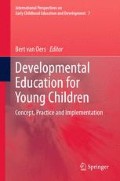Abstract
This chapter demonstrates how Developmental Education schools build developmentally productive educational partnerships with parents for the benefit of pupils. Developmental Education conceives of pupils’ development as a process embedded in a niche that brings together school and home. A prerequisite of this partnership is the team’s positive attitude toward parents by making them feel welcome, and by creating a sound communicative climate among teachers and parents. Coaching and models for team development are described in the chapter. It shows how the team is encouraged to apply different ways of informing parents about the school’s educational point of view. Then, partnership can grow by arranging meetings about mutual questions like pedagogical values and agreements. A further school initiative is inviting parents to participate in school matters such as young children’s language development, and to cooperate as experts in socio-cultural activities in and out of school.
Access this chapter
Tax calculation will be finalised at checkout
Purchases are for personal use only
Notes
- 1.
A national council that advises the Minister of Education in matters of education and schooling.
- 2.
At the time of this work, André Weijers was internal coach of a primary school in Amsterdam.
- 3.
See Chap. 4 for the phases in thematisation.
References
Booijink, M. (2007a). Handreiking: Terug naar de basis. Mogelijkheden voor het verbeteren van de communicatie tussen leerkrachten en allochtone ouders in het primair onderwijs [Helping hand: Back to the basics. Possibilities for improving communication between teachers and parents from other origins in primary education]. Leiden: Leiden University.
Booijink, M. (2007b). Onderzoeksrapport. Terug naar de basis [Research report. Back to the basics]. Leiden: Leiden University.
de Wit, C. (2005). Ouders als educatieve partner. Een handreiking voor scholen [Parents as educational partner. A hand out for schools]. Den Haag: Q*Primair.
de Wit, C. (2008). Partnerschap tussen ouders en school [Partnership between parents and school]. ‘s-Hertogenbosch: KPC Groep.
de Wit, C., Beek, S., & van Rooijen, A. (2007). Samen kun je meer dan alleen. Educatief partnerschap met ouders in primair en voortgezet onderwijs [Together one can do more than alone. Educational partnership with parents in primary and secondary education].’s-Hertogenbosch: KPC Groep en Q*Primair (Den Haag).
Duijzer, S. (2008). Opvoeden, een kwestie van respect [Bringing up children. A matter of respect]. Zone, 4, 16–18.
Epstein, J. L. (1995). School/family/community Partnerships. Caring for the children we share. Phi Delta Kappan, 76(9), 701–712.
Fleer, M. (2005). A socio-historical analysis of the formation of everyday knowledge and schooled knowledge in economically disadvantaged communities. Cognitive blocks and pedagogical gaps. Melbourne: Monash University.
Hagenaar, J. (2009). Spelen en leren in de onderbouw [Play and learning in the early grades]. In Samen, oudercontacten in ontwikkelingsgerichte scholen. Alkmaar: De Activiteit.
Hagenaar, J., Pompert, B., Weijers, A., & Peters, I. (Eds.). (2008). Levensecht Leren. Verslag van het GOA/BSN Project Samen investeren in ontwikkelingskansen van de Capelse jeugd [Lifelike learning. Report of a project about investing in development]. Alkmaar: De Activiteit.
Hargreaves, A. (2003). Teaching in the knowledge society. Education in the age of insecurity. New York: Teachers College Process.
Karpov, Y. Y. (2005). The neo-Vygotskian approach to child development. Cambridge: Cambridge University Press.
Moore, S., & Lasky, S. (1999). Parents involvement in education: Models, strategies and contexts. In F. Smit, H. Moerel, K. van der Wolf, & P. Sleegers (Eds.), Building bridges between home and school (pp. 13–18). Nijmegen/Amsterdam: ITS/SCO-Kohnstamm Instituut.
Onderwijsraad. (2010). Ouders als partners. Versterking van de relaties met en tussen ouders op school [Parents as partners. Enforcing the relations with and between parents at school]. Den Haag: Onderwijsraad.
Overmaat, M., & Boogaard, M. (2004). Neemt ouderparticipatie af? Stand van zaken en tips voor ouderraden [Is parent participation receding?] Amsterdam: SCO-Kohnstamm Instituut.
Peters, I. (2009). Koffie-ochtenden in de groep [Coffee mornings in the group]. In Samen, Oudercontacten in ontwikkelingsgerichte scholen. Alkmaar: De Activiteit.
Smit, F., Driessen, G., & Doesborgh, J. (2005). Opvattingen van allochtone ouders over onderwijs: tussen wens en realiteit [Opinions of parents from different backgrounds : Between wish and reality]. Nijmegen: Instituut voor Sociale en Toegepaste Wetenschappen.
Smit, F., Sluiter, R., & Driessen, G. (2006). Literatuurstudie ouderbetrokkenheid in internationaal perspectief [Literature study on parent involvement in international perspective]. Nijmegen: Institute voor Sociale en Toegepaste Wetenschappen.
van Brandwijk, D. (2009). Ouders doen mee in thematische activiteiten [Parents participate in thematic activities]. In Samen, oudercontacten in ontwikkelingsgerichte scholen. Alkmaar: De Activiteit.
van Kreveld, M. (2004). Migrantenmoeders doen mee op school. Kansen en werkwijzen voor ouderparticipatie op multi-ethnische basisscholen [Migrant mothers participate in school. Chances and methods for parent participation in multi-ethnic primary schools]. Utrecht: APS.
Weijers, A. (2009a). Aan de basis. Bouwen aan communicatie [At the basis. Buiding at communication]. In Samen, oudercontacten in ontwikkelingsgerichte scholen. Alkmaar: De Activiteit.
Weijers, A. (2009b). Van spelen komt lezen en schrijven [Play leads to reading and writing]. In Samen, oudercontacten in ontwikkelingsgerichte scholen. Alkmaar: De Activiteit.
Weijers, A. (2009c). Werken aan een veilig pedagogisch klimaat [Working at a safe pedagogical climate]. In Samen, oudercontacten in ontwikkelingsgerichte scholen. Alkmaar: De Activiteit.
Author information
Authors and Affiliations
Corresponding author
Editor information
Editors and Affiliations
Rights and permissions
Copyright information
© 2012 Springer Science+Business Media Dordrecht
About this chapter
Cite this chapter
Janssen-Vos, F., Weijers, A. (2012). Fostering the Teacher-Parent Partnership. In: van Oers, B. (eds) Developmental Education for Young Children. International perspectives on early childhood education and development, vol 7. Springer, Dordrecht. https://doi.org/10.1007/978-94-007-4617-6_11
Download citation
DOI: https://doi.org/10.1007/978-94-007-4617-6_11
Published:
Publisher Name: Springer, Dordrecht
Print ISBN: 978-94-007-4616-9
Online ISBN: 978-94-007-4617-6
eBook Packages: Humanities, Social Sciences and LawEducation (R0)

